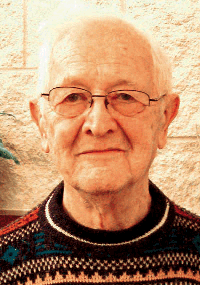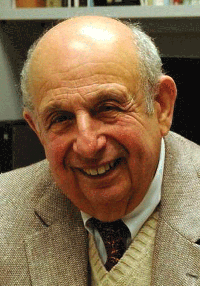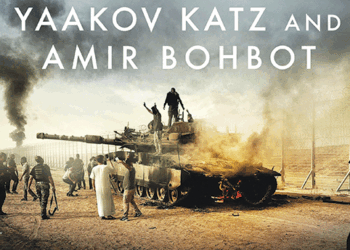Dr. Guy Stern and St. Paul’s Walter Schwarz will be reunited after 65 years for local screening of The Ritchie Boys
By ERIN ELLIOTT BRYAN / Community News Editor
Filmmaker Christian Bauer’s The Ritchie Boys is a World War II documentary about a particular group of U.S. soldiers: former refugees from Nazi-occupied Europe — most of them Jewish — who were trained to interrogate prisoners of war and extract as much military information as possible to hasten the Allied victory.
When the film was released in 2004, St. Paul’s Walter Schwarz, himself a Ritchie Boy, began organizing screenings around the Twin Cities. The most recent screening was in May at the West Seventh Street Community Center and, with the help of Dr. Ellen Kennedy, interim director of the Center for Holocaust and Genocide Studies at the University of Minnesota, publicity for the event was sent to Holocaust centers around the country.
 Walter Schwarz
Walter Schwarz
In Detroit, the announcement found its way to Dr. Guy Stern, who was serving as the interim director of the Holocaust Memorial Center. He, too, was a Ritchie Boy.
“He saw my name on that leaflet and said, ‘I knew a guy named Walter Schwarz at Camp Ritchie. Could it be the same person?’” Schwarz told the AJW. “Ellen wrote that to me and I said, ‘It sure is the same person.’ I immediately wrote to him and I can hardly wait to meet him in person.”
Sixty-five years after they last saw one another, Schwarz and Stern will reunite for a screening of The Ritchie Boys on Thursday, Nov. 12 at the Minnesota History Center in St. Paul. Stern will speak after the film.
“There are three young soldiers on the cover of the film and the one on the left happens to be Guy,” Schwarz said. “I said to my wife, ‘I know that guy from somewhere, I can’t remember where or when, but I’ve seen him.’ I remembered his face and he remembered my name.”
Schwarz was born in Romania and had been attending school in his father’s native Czechoslovakia when Germany occupied the country in March 1939. No longer allowed in school, Schwarz obtained a permit to travel back to Romania, where his father had been making “frantic efforts” to get the rest of his family to the United States, where Walter’s mother and sister had previously arrived.
“We didn’t all come together, but we all made it,” Schwarz said.
Stern’s family wasn’t so lucky. A native of Hildesheim, Germany (near Hannover), Stern was just 15 when his parents decided to send him — their eldest child — to the United States in 1937.
“It was high time for anyone to get out,” Stern remarked. “I was charged with bringing my family over here, but that didn’t come through, even though I got very close.”
Stern later learned that his family perished in the Warsaw Ghetto.
 Dr. Guy Stern
Dr. Guy Stern
Once in the United States, Schwarz and Stern tried to join the U.S. military, but they were both rejected because they were not American citizens. But, after Pearl Harbor was bombed in 1941 and the draft was instituted, both men were inducted into the U.S. Army.
Schwarz completed his basic training in Virginia and Stern completed his in Texas. They met at the Military Intelligence Training Center at Camp Ritchie, Md., where they began training to become Interrogators of Prisoners of War (IPWs).
“It was a strange camp,” Schwarz said. “There was an awful lot of foreign languages spoken, mostly German, and I found many people who had the same background as I had. The army found a valuable asset in German-speaking soldiers, so they combed the camps and they found me and they found Guy, and they put us all together and we made friends there.”
Schwarz and Stern were both sent overseas in 1944, though they were sent at different times and assigned to different units. Schwarz used his skills to interrogate mainly civilians and saw little action. Stern said he interrogated thousands of prisoners of war and was later decorated with a Bronze Star for his “method of mass interrogation.”
Following World War II, Schwarz graduated from what is now the University of Massachusetts as a textile engineer and lived in Vancouver, British Columbia, where he met his wife, Anita. They eventually moved to Madison, Wisc., where they raised five children. They both now live at Sholom Home East in St. Paul.
Stern is a professor emeritus of German literature at Wayne State University in Detroit. He is now director of the Institute of the Righteous, which “researches and promulgates the ideal of socially just behavior and altruism.”
Stern is featured in The Ritchie Boys and found an unlikely connection to the director. Stern and Bauer’s mother, who came from a Protestant family, attended the same Jewish elementary school in Germany.
“The girl’s father hit it off with our classroom teacher and he said, ‘This is the right school for my girl,’” Stern said. “That gave [Bauer] further incentive to make the movie.”
Following the film screening, Stern said he hopes to engage in a dialogue with Schwarz about their unique experiences.
“In the commemorations of the Holocaust, we Jews are so often, and justly so, depicted as victims,” Stern said. “This film shows us as activists, as active opponents of the forces that are trying to extirpate us. It is important to show that we, when necessary, are fighters and that we can prevail over the forces of evil by the strength of our convictions, and by the strength of our skills and determination.”
***
The Ritchie Boys will be screened 6:45 p.m. Thursday, Nov. 12 at the Minnesota History Center, 345 W. Kellogg Blvd., St. Paul. The cost is free.
For information on the film, visit: www.ritchieboys.com.
(American Jewish World, 10.30.09)








 Walter Schwarz
Walter Schwarz Dr. Guy Stern
Dr. Guy Stern









My wife and I were thoroughly engrossed by the movie, and enjoyed the opportunity to meet Dr. Stern. Thanks for the event and the thoughtful and generous introductions for our friend Walter and Dr. Stern.
If I’d had more time, I would have asked if either men worked with the 94th Infantry Division, which deserves Liberator status.
Hello, My Uncle Daniel Sonntag told us a story years ago that sounds very familiar to The Ritchie Boys. Now I am very curious as if this could be possible. He was born in 1922 in Krefeld, Germany, left in 1945 and returned as a US service man. Please I would appreciate any information since he never spoke of it in any detail.